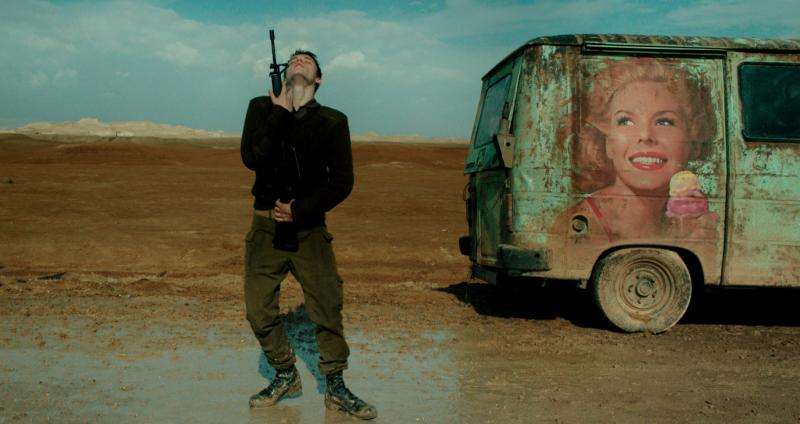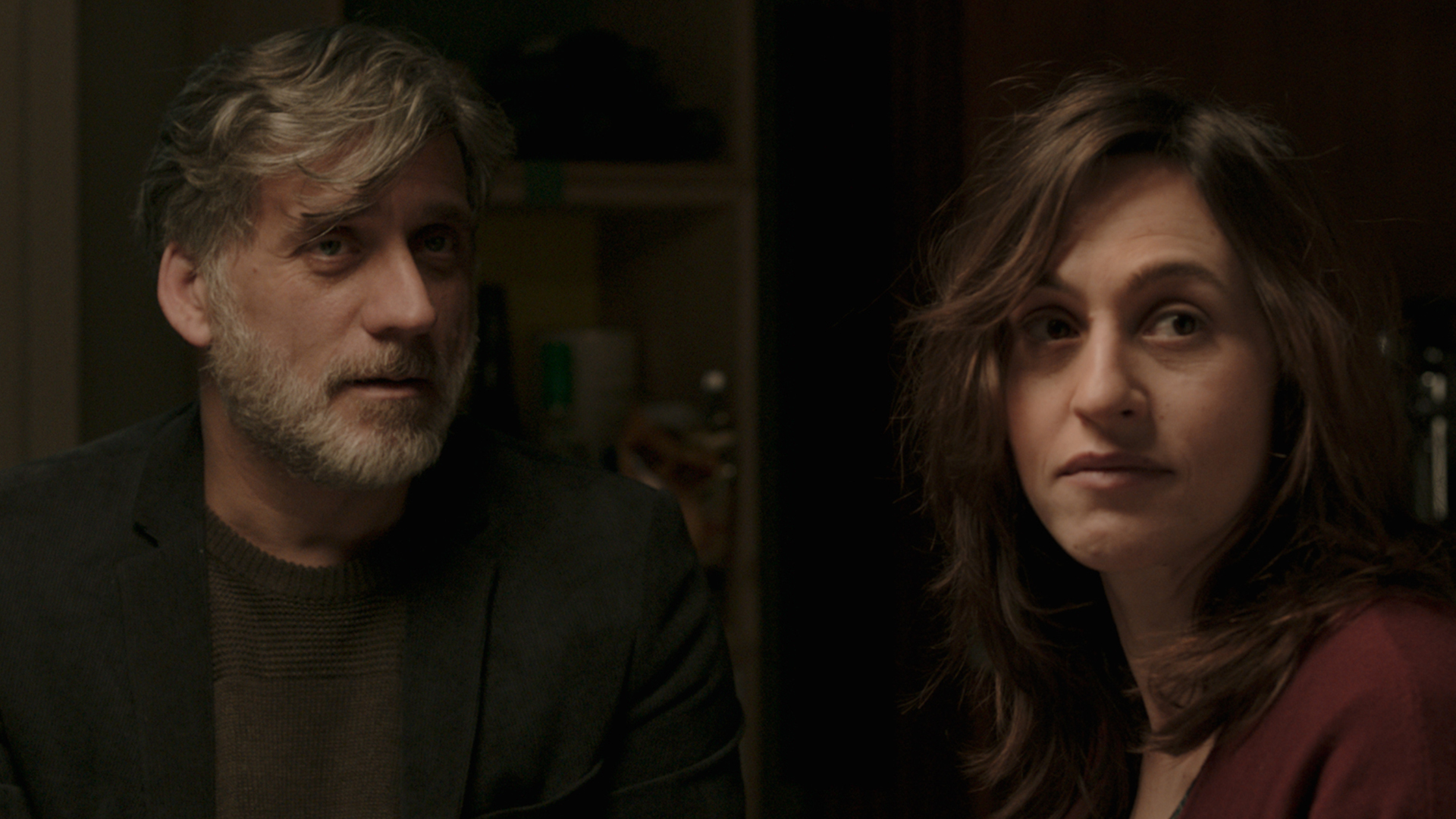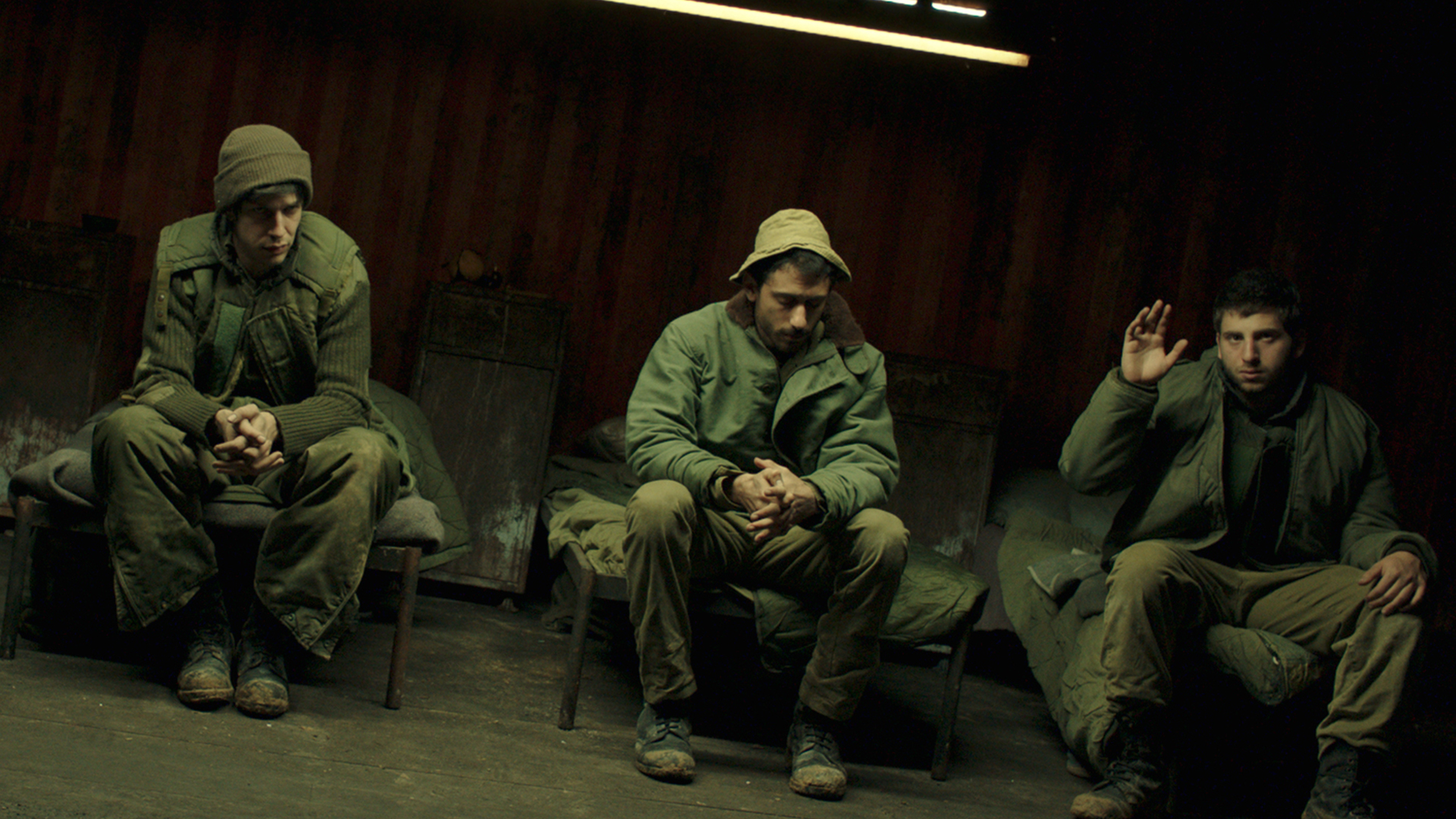Foxtrot review – controversial movie dances to an ugly tune | reviews, news & interviews
Foxtrot review – controversial movie dances to an ugly tune
Foxtrot review – controversial movie dances to an ugly tune
Both a bleak drama and a mordant black comedy showing the ruinous effects of Israel's occupation of Palestinian territory

Israeli filmmaker Samuel Maoz’s Foxtrot uses irony and visual poetry to condemn his nation’s militarism. Twenty months after the movie won the Grand Jury Prize at Venice, it opens in the UK trailing a divisive history.
The film was designed as a triptych. The first section focuses on the grief of a well-to-do Tel Aviv couple, Michael and Daphna (Lior Ashkenazi and Sarah Adler, pictured below), after military personnel inform them that their young soldier son Jonathan has been killed in action. The second section depicts a few days in the lives of Jonathan (Yonathan Shiray) and his three army comrades at a remote desert roadblock guarding a supply route in the Occupied Territories. The third part revisits Michael, Daphna, and their teenage daughter Alma (Shira Haas) six months after they received news of Jonathan’s death – by which time they have suffered a fresh horror. It’s impossible to explain what traumatized them again without relaying news received by Michael and Daphna five or six hours after they were first told Jonathan was dead. Foxtrot is one of those films it’s best to know as little as possible about – plot-wise – before seeing it. Suffice to say that Maoz (director of 2009’s visceral, autobiographically mined The Soldier’s Journey/Lebanon) is an expert writer of “reveals,” albeit a slightly manipulative one.
It’s impossible to explain what traumatized them again without relaying news received by Michael and Daphna five or six hours after they were first told Jonathan was dead. Foxtrot is one of those films it’s best to know as little as possible about – plot-wise – before seeing it. Suffice to say that Maoz (director of 2009’s visceral, autobiographically mined The Soldier’s Journey/Lebanon) is an expert writer of “reveals,” albeit a slightly manipulative one.
What he most effectively suggests is that no adult implicated in a war situation is necessarily innocent – whether combatants, soldiers detailed to tell parents their children have died, or the parents themselves. Different scenes in which Michael behaves belligerently and Daphna smiles cast them in an unsympathetic light – we harden toward them knowing full well we would likely behave as they did if we were in their shoes.
Reminiscent in some ways of M*A*S*H and Catch-22, Foxtrot excels at showing the tedium and dehumanizing effects of military deployment. Jonathan and his three comrades trudge aimlessly around their desolate outpost, doing whatever they can to relieve the monotony. One buys a plastic robot from a passing toy vendor and sets it marching toward the Checkpoint Charlie (a symbol of futility given the vast arid plain around it). Another tells an anecdote about an ancient family bible, miraculously preserved during the Holocaust, that a desperately randy boy traded for a girlie magazine in 1970. Jonathan is a gifted aspiring comic artist whose sketchbook bursts into animated life at one point. Occasionally these boys humiliate the middle-aged Arab couples who stop at the blockade by making them stand in a downpour, for example. They do much worse – offscreen – to four attractive twentysomethings who pull up, possibly for no other reason than that they’re Arabs having a good time. A droll sequence at the blockade, which is codenamed Foxtrot, shows Michael’s spontaneously funky interpretation of the eponymous dance, in which he is partnered by his assault weapon. Later on, Michael ruefully demonstrates for Dafna the movement of the foxtrot (though he doesn’t recall its name), which brings the dancer back to the position he or she started in. This is a scathing metaphor not only for Israel’s occupation of Palestinian territory but also for the misery it endlessly inflicts on the people of both states. There’s a metaphor, too, for national instability: the roomy metal container in which the four soldiers eat and sleep is sinking – one end more quickly than the other – in the mud. Lyrical though this movie is thanks to its twisty overhead tracking shots, corrosive immurement is the abiding theme.
A droll sequence at the blockade, which is codenamed Foxtrot, shows Michael’s spontaneously funky interpretation of the eponymous dance, in which he is partnered by his assault weapon. Later on, Michael ruefully demonstrates for Dafna the movement of the foxtrot (though he doesn’t recall its name), which brings the dancer back to the position he or she started in. This is a scathing metaphor not only for Israel’s occupation of Palestinian territory but also for the misery it endlessly inflicts on the people of both states. There’s a metaphor, too, for national instability: the roomy metal container in which the four soldiers eat and sleep is sinking – one end more quickly than the other – in the mud. Lyrical though this movie is thanks to its twisty overhead tracking shots, corrosive immurement is the abiding theme.
rating
Explore topics
Share this article
Add comment
The future of Arts Journalism
You can stop theartsdesk.com closing!
We urgently need financing to survive. Our fundraising drive has thus far raised £49,000 but we need to reach £100,000 or we will be forced to close. Please contribute here: https://gofund.me/c3f6033d
And if you can forward this information to anyone who might assist, we’d be grateful.

Subscribe to theartsdesk.com
Thank you for continuing to read our work on theartsdesk.com. For unlimited access to every article in its entirety, including our archive of more than 15,000 pieces, we're asking for £5 per month or £40 per year. We feel it's a very good deal, and hope you do too.
To take a subscription now simply click here.
And if you're looking for that extra gift for a friend or family member, why not treat them to a theartsdesk.com gift subscription?
more Film
 Robert Redford (1936-2025)
The star was more admired within the screen trade than by the critics
Robert Redford (1936-2025)
The star was more admired within the screen trade than by the critics
 Blu-ray: The Sons of Great Bear
DEFA's first 'Red Western': a revisionist take on colonial expansion
Blu-ray: The Sons of Great Bear
DEFA's first 'Red Western': a revisionist take on colonial expansion
 Spinal Tap II: The End Continues review - comedy rock band fails to revive past glories
Belated satirical sequel runs out of gas
Spinal Tap II: The End Continues review - comedy rock band fails to revive past glories
Belated satirical sequel runs out of gas
 Downton Abbey: The Grand Finale review - an attemptedly elegiac final chapter haunted by its past
Noel Coward is a welcome visitor to the insular world of the hit series
Downton Abbey: The Grand Finale review - an attemptedly elegiac final chapter haunted by its past
Noel Coward is a welcome visitor to the insular world of the hit series
 Islands review - sunshine noir serves an ace
Sam Riley is the holiday resort tennis pro in over his head
Islands review - sunshine noir serves an ace
Sam Riley is the holiday resort tennis pro in over his head
 theartsdesk Q&A: actor Sam Riley on playing a washed-up loner in the thriller 'Islands'
The actor discusses his love of self-destructive characters and the problem with fame
theartsdesk Q&A: actor Sam Riley on playing a washed-up loner in the thriller 'Islands'
The actor discusses his love of self-destructive characters and the problem with fame
 Honey Don’t! review - film noir in the bright sun
A Coen brother with a blood-simple gumshoe caper
Honey Don’t! review - film noir in the bright sun
A Coen brother with a blood-simple gumshoe caper
 The Courageous review - Ophélia Kolb excels as a single mother on the edge
Jasmin Gordon's directorial debut features strong performances but leaves too much unexplained
The Courageous review - Ophélia Kolb excels as a single mother on the edge
Jasmin Gordon's directorial debut features strong performances but leaves too much unexplained
 Blu-ray: The Graduate
Post #MeToo, can Mike Nichols' second feature still lay claim to Classic Film status?
Blu-ray: The Graduate
Post #MeToo, can Mike Nichols' second feature still lay claim to Classic Film status?
 Little Trouble Girls review - masterful debut breathes new life into a girl's sexual awakening
Urska Dukic's study of a confused Catholic teenager is exquisitely realised
Little Trouble Girls review - masterful debut breathes new life into a girl's sexual awakening
Urska Dukic's study of a confused Catholic teenager is exquisitely realised
 Young Mothers review - the Dardennes explore teenage motherhood in compelling drama
Life after birth: five young mothers in Liège struggle to provide for their babies
Young Mothers review - the Dardennes explore teenage motherhood in compelling drama
Life after birth: five young mothers in Liège struggle to provide for their babies

Comments
"... possibly for no other